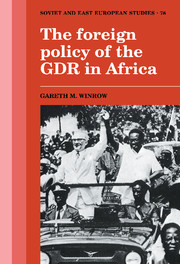Book contents
- Frontmatter
- Contents
- List of tables
- Preface
- Abbreviations
- 1 Introduction
- 2 The development of GDR relations with Africa in the pre-recognition period
- 3 The GDR in Africa in the 1970s
- 4 East German military/security involvement in Africa
- 5 East German economic relations with Africa
- 6 The GDR in Africa in the 1980s
- 7 Conclusion
- Notes
- Select bibliography
- Index
- Soviet and East European Studies
3 - The GDR in Africa in the 1970s
Published online by Cambridge University Press: 11 January 2010
- Frontmatter
- Contents
- List of tables
- Preface
- Abbreviations
- 1 Introduction
- 2 The development of GDR relations with Africa in the pre-recognition period
- 3 The GDR in Africa in the 1970s
- 4 East German military/security involvement in Africa
- 5 East German economic relations with Africa
- 6 The GDR in Africa in the 1980s
- 7 Conclusion
- Notes
- Select bibliography
- Index
- Soviet and East European Studies
Summary
Introduction
East German foreign policy in Africa in the post-recognition period became motivated by factors not, at first sight, immediately akin to the quest for diplomatic recognition which had so dictated the GDR's manoeuvrings on the continent prior to 1972. Nevertheless, the continuing perceived need for Honecker to establish more firmly the legitimacy of the ‘socialist’ GDR remained a key determinant in the GDR's Afrikapolitik. Involvement in Africa also provided a means of influencing more favourably the USSR's estimation of the GDR through a strategy of affiliation.
Once general recognition was secured, the GDR, in line with the USSR, had concentrated attention in the years between 1973–5 on the European environment, where negotiations on issues of fundamental importance concerning political and military security were conducted in Helsinki (Conference on European Security and Cooperation) and Vienna (talks on Mutual Balanced Force Reductions in Central Europe). Visible participation in these conventions served to enhance East German prestige. The Helsinki Final Act, which confirmed the political and territorial status quo in Eastern Europe, was of overwhelming importance in further establishing the legitimacy of the GDR.
The liberation of the Portuguese colonies in southern and west Africa, the enforced oil price rise within the CMEA, and the progress of the Ethiopian revolution, shifted East German attention back to the African continent. With the implementation of détente in Europe (including a measure of ‘enforced’ inter-German détente with a series of agreements concluded after the Basic Treaty), events in Africa offered the USSR further opportunities to acquire increased leverage in the Third World without – Moscow hoped – jeopardising détente.
- Type
- Chapter
- Information
- The Foreign Policy of the GDR in Africa , pp. 85 - 120Publisher: Cambridge University PressPrint publication year: 1990



